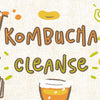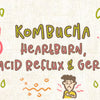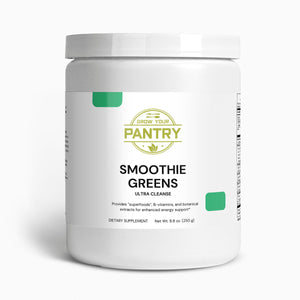Kombucha on Heartburn, Acid Reflux, and GERD | What's The Problem?
Kombucha is often touted for its health-related benefits and its overall impact on the immune system and gut bio. However, due to its components such as acetic acid and live probiotics, there are some concerns in terms of its overall effect on heartburn, acid reflux, gastroesophageal reflux disease (GERD), and other associated symptoms. Let’s dive into the interactions of kombucha with the gut bio and its effect on heartburn, acid reflux and GERD.
[Disclaimer: This article does not purport to offer medical advice or substitute medical consultation. If you are experiencing a negative reaction or symptoms to any remedy you should seek qualified medical advice from a doctor.]
Here at Grow You Pantry we grow our own SCOBYs! If you're interested in SCOBYs, pH Strips, Covers or other kombucha accessories check out Our Store for the latest price.
What is Acid Reflux?
Acid reflux is a common medical condition that’s characterized by burning pain in the lower chest area. Acid reflux occurs when stomach acid flows upwards into the esophagus. The acid irritates the food pipe’s inner lining, known as the mucosa, causing the burning sensation.
Causes
-
LES Failing to Close All the Way Up
The esophagus connects with the stomach through a ring of muscle known as the lower esophageal sphincter (LES). The LES lets food pass through into the stomach and immediately closes up to prevent the stomach contents from rising back up into the food pipe. When this muscle fails to close all the way up, the food plus stomach acid will back up into the esophagus, causing a burning sensation and sharp pain in the lower chest area as the acid burns the inner lining.
-
Hiatal Hernia
Hiatal hernia refers to the health condition whereby the stomach bulges up through a hole in the diaphragm into the chest area. The condition prevents the esophagus from pushing the food all the way into the stomach, and the additional pressure in the chest area is applied on the stomach, forcing food and hydrochloric acid to escape into the esophagus. This can lead to more complications beyond acid reflux, such as chest pains and shortness of breath.
Acid Reflux Symptoms
Reference Article: What Is Acid Reflux? - WebMd
1. Heartburn
This is a burning pain sensation that’s often felt in the lower section of the chest, essentially where the esophagus lays. The burning sensation can even move up the throat, depending on the severity of the acid reflux. It's important to note that despite its name, this condition has nothing to do with the heart.
2. Regurgitation
Regurgitation is the sensation of acid backing up through the throat and at times to the back of the mouth. This sensation produces a bitter or sour taste and is often accompanied by wet burps.
3. Dyspepsia
Dyspepsia is a medical syndrome often characterized by general stomach discomfort. Dyspepsia can cause burping, nausea after eating. Stomach fullness, bloating, and upper abdominal pain.
When Does Acid Reflux Mostly Occur?
1. After a heavy meal
2. When bending over
3. When lifting objects from a standing position
4. When lying down on your back
What is Heartburn?

Reference Article: Heart Burn And Acid Reflux - NHS.com
Heartburn is a burning pain that’s often felt in the lower chest area just behind the breastbone. While occasional heartburns are common, recurring heartburns are often an indication of an underlying problem.
Causes
1. Acid Backing Up
Heartburns occur when hydrochloric acid backs up into the esophagus. This happens when the lower esophageal sphincter weakness or relaxes abnormally, allowing stomach acid to flow into the food pipe.
Symptoms
1. Burning sensation in the lower part of the chest just behind the breastbone
2. Increased pain when in the throat when bending over or lying down
3. Bitter and acidic taste in the back of your mouth
When Does Heartburn Mostly Occur?
1. After eating
2. In the evening
3. When lying down
4. When bending over
What is GERD?
Reference Article: Gerd Symptoms - aaai.org.
Gastroesophageal Reflux Disease or simply GERD is a chronic condition that occurs when the esophageal sphincter relaxes, allowing stomach acid juices to flow back up into the esophagus.
Causes
1. Chronic Acid Reflux
GERD develops when acid reflux occurs regularly for up to 2 weeks without any form of relief from using over the counter medication. This constant acidic irritation damages the inner lining of the esophagus, causing it to become inflamed, which increases the occurrence of acid reflux.
2. Risk Factors
Risk factors are conditions that play a role in increasing the risk of chronic acid reflux, which causes GERD.
-
Obesity
-
Hiatal hernia
-
Pregnancy
-
Scleroderma and other connective tissue disorders
-
Delayed stomach emptying
-
Smoking
-
Eating large meals
-
Eating late at night
-
Eating overly fatty and fried foods
-
Drinking too much coffee or alcohol
-
Certain medications, e.g., aspirin
Symptoms
1. Acidic regurgitation after eating
2. Pain and difficulty when swallowing food
3. A sudden flow of excess saliva
4. Chronic sore throat
5. Chest pains
6. Bad breath
7. Cavities
8. Inflammation of the gums
9. Hoarseness
10. Chronic cough and new or worsening asthmatic attacks
11. Sleep disruption
Are They All the Same Condition?
While the three conditions might seem to be the same thing, they are different in more than one way.
Differences
1. Heartburn is common and can even affect perfectly healthy people, and its occurrence once in a while doesn’t spell any significant health complication. Acid reflux, on the other hand, is what causes heartburns. Finally, GERD is merely chronic acid reflux, and it indicates underlying severe medical issues.
2. GERD requires medical intervention in order to cure/ reduce its chronic symptoms. However, acid reflux can be fixed by lifestyle changes, while heartburn can simply go away on its own or by taking over the counter antacids.
Similarities
1. Heartburn is the most common symptom of both GERD and acid reflux
2. Acid reflux, heartburn, and GERD are all caused by the same factors albeit at different levels
Can Kombucha Cause These Conditions?

Kombucha can at times trigger these conditions due to its contents and an expected adverse reaction. The increased acidity in the stomach that might arise from consuming kombucha can, therefore, lead to acid reflux and heartburn.
Can Kombucha Cause Acid Reflux?
While there’s not enough evidence on the benefits or risks of drinking kombucha in relation to acid reflux, the brew does contain contents which can worsen acid reflux condition. This reaction is not limited to kombucha only, other acidic drinks can also trigger acid reflux.
Why Does Kombucha Cause Acid Reflux?
Kombucha contains alcohol, caffeine, and acetic acid, all of which can trigger acid reflux. It's important to note that raw kombucha contains live probiotics. These can alleviate digestive issues, thus reducing acid reflux, and balancing off some of the risks.
Can Kombucha Cause Heartburn?
Drinking kombucha in excess can trigger heartburns as it contains a lot of dissolved carbon dioxide gas and acetic acid.
Why Does Kombucha Cause Heartburn?
The dissolved carbon dioxide in kombucha increases the pressure in the stomach after consumption. The extra pressure can force the esophageal sphincter to release stomach acids into the food pipe, causing heartburn.
GERD

Can Kombucha Cause GERD?
Current evidence indicates that kombucha can worsen already existing GERD.
Why Does Kombucha Cause GERD?
Kombucha is acidic, which only serves to make matters worse when it comes to GERD. The acidity, combined with caffeine and alcohol content in the brew, can trigger pre-existing GERD.
Can Kombucha Help Alleviate These Conditions?
Can Kombucha Help Alleviate Acid Reflux?
Kombucha contains acetic acid, which increases stomach acidity and further irritates the food pipe. Currently, there isn’t any medical evidence that kombucha alleviates acid reflux.
Can Kombucha Help Alleviate Heartburn?
Drinking kombucha does not help in alleviating heartburn due to the fact that the drink is acidic. Kombucha also slows down the digestion process meaning that food will take much longer to move along from the stomach, which only serves to increase the occurrence of heartburn.
Can Kombucha Help Alleviate GERD?
While there are some long-term benefits to drinking kombucha, which might help in alleviating GERD, the short-term risk of increased acidity offsets such gains. Raw kombucha contains live probiotics that improve the overall health of the digestive system by eliminating harmful bacteria culture. This benefit can, however, only be a preventive measure against GERD, not a curative action considering the increased acidity, caffeine intake, and carbon dioxide gases that are in kombucha.
Kombucha and Detox
Kombucha has a detoxifying effect when consumed regularly. Kombucha contains probiotics and antioxidants, which play a significant role in eliminating toxins from the body cells and the gut bio as a whole. However, this cleansing effect can trigger detoxification side effects such as muscle cramps, diarrhea, fatigue, headaches, and even fever.
Does Detox Produce Acid Reflux Related Symptoms?
For first-time kombucha users, the side effects of the detox process can become more pronounced and may even lead to heartburn, acid reflux, and a flare-up of GERD.
Kombucha Probiotics and Benefits for Acid Reflux, GERD and Heartburn
The probiotics in kombucha help in restoring a natural balance in the gut bio, which plays a role in protecting the stomach lining and even preventing regurgitation. It’s important to note that these are only preventative effects, not curative effects.
Other Drinks That Are Good for Acid Reflux, Heartburn, and GERD
1. Ginger Tea
Ginger tea has a natural soothing effect on the stomach, which helps in reducing the production of stomach acid, thus cutting back on the occurrence of heartburn, acid reflux, and to some extent GERD. If the drink is too spicy for your preference, you can sweeten it with a little honey. Avoid ginger ale as it is carbonated, which can worsen the situation.
2. Yogurt
Yogurt that’s not too sour does contain live probiotics, which help in restoring the gut bio balance, thus preventing acid reflux.
3. Low Fat Milk
Low-fat milk (fat-free skim milk) can relieve heartburn and is also a rich source of calcium. However, full-fat dairy contains fat molecules which only serve to worsen the heartburns.
Conclusion
Kombucha is rich in probiotics and antioxidants, which play a critical role in defending the body. However, kombucha should under no circumstance be used as a substitute for medication. If you are experiencing chronic heartburns, you should seek medical attention. Avoid consuming kombucha if you are currently experiencing a flare-up of acid reflux and GERD to avoid further complications.








When i eat anything fatty,a bad smell comes into play. I used to love eggs, butter lamb chops peanut butter, cashews. Now all of that i can’t eat anymore because of the bad smell 😫.